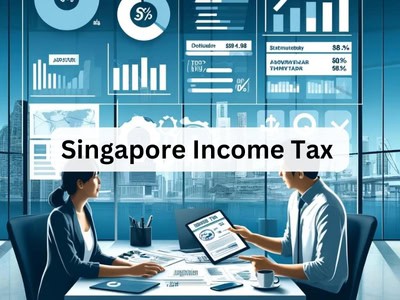This post is also available in:
简体中文 (Chinese (Simplified))
Beginner’s Guide to Singapore Income Tax

As tedious as it may be, every employed Singaporean needs to understand income tax in order to pay their taxes. If you are a foreigner and plan to reside in Singapore in the near future, knowing about Singapore’s income tax will definitely come in handy for you. This article will explore types of Singapore income tax, why you need to know them, and where to pay them.
What Is Singapore Income Tax?
Being one of the strongest economies and fastest-growing countries in Asia, Singapore owes it all to its impeccable tax system and regulations. Many countries around the world regard Singapore as a tax haven. The country’s favorable immigration policies make it easy for foreigners to begin or move their business in the country. Apart from that, Singapore also offers attractive tax rates and tax breaks. Plus, citizens and residents get to enjoy a relatively low personal and corporate tax.
Like every other country, Singapore also imposes a tax on its residents and companies as a source of revenue, albeit slightly different. According to its law, residents must file and submit their income tax reports before the end of a tax year. In Singapore, whether or not a person has tax obligations depends on their tax residency status. As for companies that run a business and derive an income in the country, they are obligated to pay taxes as well.
Aside from the plentiful benefits to both residents and non-residents, the tax system in this country is advantageous to business owners and investors too. If you are considering moving to Singapore or opening a business here, it might just be the right move for you!
Why Do You Need to Know the Singapore Income Tax?
Everybody is aware of the Singaporean tax system – however, not everyone comprehends it at the same level. Some people are well educated on the matter, and others know a thing or two about taxes.
As responsible citizens, it is one’s duty to properly educate themselves on what taxes are and how they work. Most importantly, thoroughly understanding the income tax in Singapore allows one to calculate and submit their income tax report on time accurately. Dire consequences await those who do not take income taxes seriously. The punishment for not paying taxes in full and on time can be in the form of an imprisonment term, a monetary fine, or both.
Knowing about Singapore’s income tax becomes all the more important if your employment or business involves income tax to pay to the Singapore government. It may be slightly complicated to learn, nevertheless learning about incomes taxes should not be treated as a choice. It is a necessity to know about the taxes of the country you live or work in.
Where Do You Need to Pay Your Singapore Income Tax?
You will be paying your income taxes to the tax administration body of Singapore, the Inland Revenue Authority of Singapore (IRAS). For more information on IRAS Singapore, you can visit the IRAS website.
Two Types of Singapore Income Tax
There are two types of income tax in Singapore you need to pay close attention to personal income tax and company income tax. Personal income tax is an individual tax that must be paid by those who earn $22 000 or more to the government. On the other hand, we have company tax, which every company in Singapore must pay. See below for more clarifications on these two types of Singapore income tax.
Singapore Personal Income Tax
Personal income tax depends on your residency status. If one happens to be a Singaporean citizen or a Singapore Permanent Resident, they will need to pay tax. Aside from that, if one happens to stay or work in Singapore for 183 days or more, they will be treated as a tax resident. Singaporeans and their residents who earn $22 000 (gross income) or below, annually, are exempted from paying taxes.
As for those who do not fall under either condition, they will be considered non-tax residents. Singapore runs on a progressive tax basis. This means that eligible residents who earn higher than the others will be taxed proportionately higher as well. Currently, the highest personal income tax rate is capped at 22%.
Singapore Company Income Tax
Company income tax, also sometimes known as corporate tax, is levied at all companies that run a business in Singapore. At the time being, the company income tax in Singapore is capped at 17%. The country has adopted a territorial tax system to avoid double taxation. As of today, Singapore has signed more than 80 tax treaties with countries around the globe.
Singapore taxes on revenue but does not tax on dividends and capital gains. Besides that, Singapore also gives various tax reliefs, incentives, and rebates, resulting in a significant tax deduction. This would mean that although the current Singapore company income tax is capped at 17%, the overall effective tax rate can be much lower.
Singapore Income Tax Assistance
We understand that filing and submitting income taxes are dull jobs to do. It involves multiple calculations and requires hours of your utmost attention. However, not all of us have the luxury of time and doing our taxes properly.
That’s why we at 3E Accounting Singapore offer our services! Leave your worries at the door and let us handle your taxes. Our multidisciplinary team of experts on matters pertaining to finance, law, and commerce will carefully calculate your taxes and ensure you pay them on time, every time. Contact us today!



